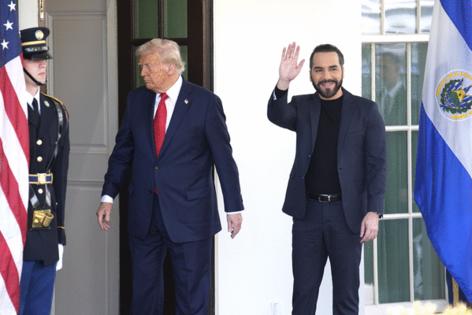Trump administration exaggerates its powers in foreign policy
Published in Political News
Despicable is the Trump administration’s refusal to ask Nayib Bukele, the authoritarian president of El Salvador, for the return of Armando Abrego Garcia, a man who was sent to a notoriously harsh prison there by a U.S. acknowledged “administrative error.”
Using such heinous deportations without legal due process eliminates the possibility of catching such mistakes before they become even more heinous injustices; that is the purpose of due process in the American judicial system, which is why the Supreme Court ruling in the case demanded it for all potential deportees.
Going even further out on a constitutional limb, Dean John Sauer, former Trump personal lawyer and now Solicitor General of the United States, argued that any federal court cannot compel a president to engage in foreign diplomacy to facilitate the return of Garcia. According to Sauer, “The Constitution charges the President, not the federal district courts, with the conduct of foreign diplomacy and protecting the nation against foreign terrorists, including their removal.”
Setting aside that no due process was given to Garcia, who has protected legal status in the United States and has a wife who is a U.S. citizen, to determine whether he was a gang member or terrorist before he was essentially kidnapped and sent to the infamous CECOT mega-prison in El Salvador, Sauer’s conception of presidential constitutional powers in foreign policy is grandiose.
In fact, nowhere in the text of the Constitution is enumerated an exclusive executive power over foreign diplomacy. The president does have the power to receive foreign ambassadors and nominate U.S. ambassadors and ministers, but only with congressional approval. Also shared is the treaty power, with the executive empowered to make treaties with foreign governments, subject to approval of a supermajority of two-thirds of the U.S. Senate.
All in all, despite the common wisdom, the Constitution enumerates many more powers over national security and foreign policy for Congress than it does for the executive branch.
In practice over the history of the republic, the president has conducted day-to-day foreign diplomacy, but within the confines of congressional legislation as interpreted by the federal courts. In fact, one of the chief executive’s most important enumerated constitutional responsibilities is to “take care that the Laws be faithfully executed.”
Beginning during the Reagan administration, some Republican executive officials had become frustrated with Congress reasserting its constitutional powers that had been usurped by Presidents Lyndon B. Johnson and Richard M. Nixon during the Vietnam War and the Watergate scandal.
Having gotten used to these artificially inflated executive powers and ignoring the many shared constitutional powers between the governmental branches in the text of the Constitution, those officials invented out of whole cloth the ahistorical unitary theory of the executive, which posits a super presidency that tries to brush off many of the limits the other two branches have tried to use to constrain the unilateral exercise of executive power.
Unfortunately, many justices in the current Supreme Court’s majority have an affinity for this theory that would make most of the nation’s founders roll over in their graves.
Some officials of the Trump administration, including President Donald Trump and Vice President JD Vance, are trying to put the unitary theory of the executive on steroids, claiming that the pesky Congress and courts cannot interfere with “inherent” presidential powers, especially in foreign policy.
Yet the nation’s founders established three separate branches of government with cumbersome shared powers to achieve one overriding objective: creating checks and balances to prevent tyranny. When people can be abducted off the streets with no due process, the wolf of tyranny is now at the door. The other branches of government — the courts and Congress — need to awaken from their slumber to bring the lawless Trump administration to heal, even in foreign diplomacy.
____
Ivan Eland is Senior Fellow with the Independent Institute and author of "War and the Rogue Presidency."
___
©2025 Tribune Content Agency, LLC.




























































Comments